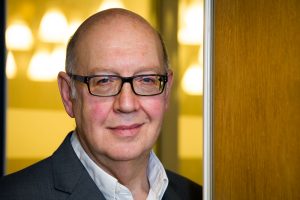The PCRF grant (2012-2015), enabled Professor Stephen Neidle (pictured below) and his team at UCL in London to test two compounds they had developed and verify in experiments on mice that they could block the actions of key genes responsible for driving pancreatic cancer growth.
The compounds were created to work in a completely new way from current available drugs, targeting specific abnormalities in the human genome that are found in several cancers that are resistant to chemotherapy – including pancreatic cancer.
Since the PCRF grant ended, Prof Neidle used the knowledge gained from this early work to create a new version of the compound with the most potential, known as CMO3, to make it even more potent.
“This was a significant challenge, but what we’ve got now is ‘son and daughter’ of CM03, if you like. We were fortunate to secure a very large amount of funding to allow us to achieve that, but the foundations of this achievement were part-funded by PCRF and this funding was very important,” says Prof Neidle.

In early 2022, Prof Neidle licensed the compounds and technology behind it to Qualigen, a small biotechnology company in San Diego USA who will take the drug – now known as QN-302 – to clinical trials. Once their application is approved by the US regulatory body, the Food and Drug Administration, the trials should start in late 2023.
Prof Neidle is still very much involved as a consultant in the programme. “There are two steps to complete before the trials start, which we’re currently working on,” he explains. “We’re confirming that we can produce the compounds in larger quantities – it’s so potent we’ve only been working with thousandths and hundredths of a gram so far – and then we need to undertake tests to prove that it’s safe to use in humans. But once these regulatory toxicology tests are complete, we’ll be ready to start clinical trials first in the US and then hopefully in Europe. We’ll test the drug against a number of different cancer types, but pancreatic cancer will be part of this mix, and we have several leading US pancreatic cancer oncologists in the team who are cautiously excited about its potential.”
Says Prof Neidle: “We all know that pancreatic cancer is a particularly challenging disease to treat and you have to have a certain stubbornness to keep going – I really should have retired by now! We are over the moon with the progress we’ve made and our partners at Qualigen have the drive and enthusiasm to take these compounds forward. It’s important to us that PCRF’s supporters know that our early work that they enabled has been a critical part of the story to date, and at the time it was an important psychological boost for my team and myself to keep going.”
Maggie Blanks, PCRF’s CEO commented: “It’s always heartening to hear the progress of early-stage research that our funding supported. We know that our funding is small compared with how much money it takes to develop a new drug, but we also know that if this early work isn’t funded, then opportunities to make a real difference to patients in the future could be missed.
Prof Neidle has promised to keep us informed of further progress and we look forward being able to report positive news to our supporters in due course!
